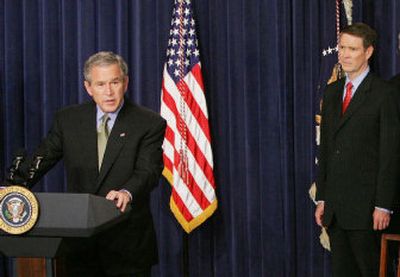Congress OKs bills, adjourns

WASHINGTON – After years of partisan impasses and legislative failures, Congress in a matter of hours Friday passed or advanced three far-reaching bills that will allocate billions of dollars and set new policies for guns, roads and energy.
The measures sent to President Bush for his signature will grant $14.5 billion in tax breaks for energy-related matters and devote $286 billion to transportation programs, including 6,000 local projects, often called pork barrel. The Senate also passed a bill to protect firearms manufacturers and dealers from various lawsuits. The House is poised to pass it this fall.
Combined with the Central American Free Trade Agreement that Congress approved Thursday, the measures constitute significant victories for Bush and GOP congressional leaders, who have been frustrated by Democrats in some areas such as Social Security. As senators cast vote after vote in order to start their August recess today, Bush applauded Congress, saying the energy bill “will help secure our energy future and reduce our dependence on foreign sources of energy.”
Capping a long day of debates and roll calls, the Senate scheduled hearings for Supreme Court nominee John G. Roberts Jr. to begin Sept. 6, and voted to reauthorize portions of the Patriot Act, granting sweeping new powers to authorities to combat terrorism, although the chamber remains at odds with the House.
The bills approved this week won varying degrees of support from Democrats, with most of them opposing the trade pact and gun bill. The energy bill passed the Senate 74-26, but Minority Leader Harry Reid, D-Nev., denounced it as a missed opportunity to lower gasoline prices and reduce U.S. dependence on foreign oil.
Even some senior Republicans said the transportation and energy bills passed largely because House and Senate leaders loaded them with pork barrel projects and jettisoned contentious measures coveted by conservatives, such as opening the Arctic National Wildlife Refuge to oil drilling. Congress will consider the drilling proposal separately later this year.
“Finally, by pure exhaustion, we’re going to stagger across the finish line, emaciated and without much to brag about,” Sen. Trent Lott, R-Miss., said in an interview. “The only way we got the energy bill was to pick a lot of the meat out of it. This is not a particularly impressive bill.”
The House and Senate have engaged in pre-vacation voting marathons before, but few have involved so much major legislation that was bottled up for so long. Lawmakers have wrangled over the energy bill for more than four years, only to see it sink under the weight of competing priorities and regional differences. Gun advocacy groups have pushed for the liability-protection bill for four years.
Even the massive transportation bill – usually a bipartisan favorite because it delivers jobs, bridges and mass transit aid to so many districts – failed to jell for two years, mainly because of quarrels over state funding distributions. The House and Senate passed it Friday by overwhelming margins.
Lawmakers cited several factors for the breakthrough in the long-awaited bills, including high gasoline prices and a greater GOP willingness to include Democrats in the early drafting stages, especially for the energy bill. But some attributed it mainly to Bush’s re-election and the Republicans’ continued control of both legislative chambers, giving Democrats little choice but to join GOP efforts or have no say in how bills are shaped.
“They just have great cards,” said Sen. Ron Wyden, D-Ore. “They’ve got all three branches of government. They’ve got the bully pulpit.”
Friday’s action also included Senate approval, 99-1, of $1.5 billion in additional spending for veterans’ health care programs. The House approved the spending Thursday.